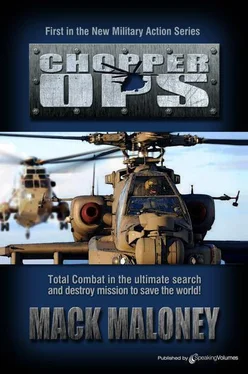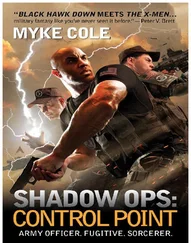Mack Maloney - Chopper Ops
Здесь есть возможность читать онлайн «Mack Maloney - Chopper Ops» весь текст электронной книги совершенно бесплатно (целиком полную версию без сокращений). В некоторых случаях можно слушать аудио, скачать через торрент в формате fb2 и присутствует краткое содержание. Город: Naples, FL, Год выпуска: 2011, ISBN: 2011, Издательство: Berkley, Жанр: Боевик, на английском языке. Описание произведения, (предисловие) а так же отзывы посетителей доступны на портале библиотеки ЛибКат.
- Название:Chopper Ops
- Автор:
- Издательство:Berkley
- Жанр:
- Год:2011
- Город:Naples, FL
- ISBN:978-1-61232-148-6
- Рейтинг книги:3 / 5. Голосов: 1
-
Избранное:Добавить в избранное
- Отзывы:
-
Ваша оценка:
- 60
- 1
- 2
- 3
- 4
- 5
Chopper Ops: краткое содержание, описание и аннотация
Предлагаем к чтению аннотацию, описание, краткое содержание или предисловие (зависит от того, что написал сам автор книги «Chopper Ops»). Если вы не нашли необходимую информацию о книге — напишите в комментариях, мы постараемся отыскать её.
Chopper Ops — читать онлайн бесплатно полную книгу (весь текст) целиком
Ниже представлен текст книги, разбитый по страницам. Система сохранения места последней прочитанной страницы, позволяет с удобством читать онлайн бесплатно книгу «Chopper Ops», без необходимости каждый раз заново искать на чём Вы остановились. Поставьте закладку, и сможете в любой момент перейти на страницу, на которой закончили чтение.
Интервал:
Закладка:
Smitz shrugged. “Officially,” he began, “the Iraqi government is suspected of giving aid and comfort to this situation. The plane is now apparently based somewhere in Iraq. And the fact that it was used against some Iraqis nationals—well, that happens every day over there. But…”
“But?”
“But it has also been reported taking out some Checs—and they are enemies of Iran. And as you saw, it was in Bosnia, at least once, doing someone’s bidding. And in Somalia. And out over the Indian Ocean. And these are just the incidents we know about. There’s a chance this thing is out there every night, shooting up something. It’s only on the rare occasion that it leaves a lot of evidence behind.”
“Are you saying that someone is renting this thing out?” Norton asked.
Smitz just shrugged again. “It’s a good question—and a hard one to answer,” he replied. “When we look at the targets it’s hit, they have a few things in common. They are all low-priority stuff. Lightly defended, if at all. Many involve civilians. And they all seem to be, if you’ll pardon the expression, ‘small’ enough not to cause a whole lot of attention.”
“Like flying hit men,” someone in front called out. “Quiet. Efficient.”
Smitz paused; he was obviously choosing his words very carefully.
“To answer your question, no one knows for certain if this thing is flying around as a kind of airborne mercenary. That’s why everyone here has been called in. That’s why this unit has been thrown together.”
Another thirty seconds went by in absolute silence.
No one said a thing. No one moved. The briefing had suddenly taken a surreal turn. They’d all sat through thousands of mission pre-briefings, post-briefings, and backgrounds. They were always routine. But not this one. This seemed right out of a bad movie.
“Thrown together?” another voice finally asked. “As in thrown together to stop this thing?”
Smitz just nodded. “Those are our orders.”
More silence, but now it was broken by some murmuring.
Delaney raised his hand as if he was in the fifth grade.
“Can I ask a question?” he said. “Who shot that last tape? The one of the refueling?”
Smitz checked his NoteBook. “‘One of the NSA’s airborne assets,’ is all it says here.”
“Is that to mean a spy plane of sorts?”
Smitz just nodded again. The guy in the Angel cap shifted a little in his seat.
“Well,” Delaney went on. “If you can get a spy plane in close enough to shoot that footage, and you really want to get rid of this thing, why not just go in with a couple F-15’s loaded for bear and shoot the fucker down? Poof! End of problem.”
It was another good question. If the rogue airplane is causing so much destruction and you know where it is, why not just go in and blow it out of the sky?
Smitz thought a long time before replying. Finally, he just said: “I believe the answer to that question is classified.”
But Delaney was puzzled—they all were. “Classified? Well, let me rephrase it then,” he said. “Why do you need us or anyone else to go in and take it out?”
Smitz just shook his head again.
“Because your mission is not to destroy that AC-130,” Smitz replied. “Your mission is to recover it—and free the original crew. We believe they are being held captive at the same location the plane is operating from. If this is the case, then you will go in, rescue them, carry them out, and if possible, fly the plane out too.”
Now a storm of gasps went through the room. No one could speak. Not even Delaney for a moment. But finally he managed to blurt out: “You mean you want us to fly over to Iraq, stop whoever is flying the airplane, recover it, and bring the original crew back?”
“Precisely,” Smitz replied.
The briefing would last for two more hours.
Smitz wound up fielding the same angry questions over and over again. Why didn’t the U.S. just send in some fighters to shoot down the rogue airplane while in flight? Why not destroy it with cruise missiles while it was on the ground— then go in and get the original crew? The people in the room came up with a hundred different ways how the gunship could be destroyed—and sending in a helicopter-borne force, manned mostly by inexperienced personnel, was not among them.
But Smitz stood his ground, answering truthfully that security concerns prevented all the remedies suggested—and mandated the one the CIA had put into motion. A helicopter force would transit to the Middle East, find the rogue airplane’s base, raid it, rescue the original crew, and if possible fly the airplane back out. Those were the mission specs.
But how that was going to be accomplished would not be revealed to the unit just yet. There was still more training to do, Smitz explained. Live training. This meant the marathon sessions spent by the pilots in the simulators were coming to an end.
But there was little cheer in this. The lack of details about the operation itself upset those assembled to the point of revolt. If the most essential information on their mission wasn’t going to be revealed to them now, one of them complained, then this wasn’t “the mother of all briefings” as had been promised.
But Smitz held firm again. Later on they would learn the logistics of the raid. Those were the orders.
To that, Delaney declared with a loud burp: “Then you should call the next session the ‘ motherfucker of all briefings.’”
Things deteriorated further after that. The comments got more raucous, more acid-toned. But as it turned out, the one question Smitz had dreaded the most didn’t get asked until just before the briefing ended. Oddly, it was one of the SEAL medics who brought it up.
“If the CIA believes the plane’s original crew is being held prisoner,” he asked, “then who is flying the gunship these days?”
Wisely, Smitz had prepared a response to this query ahead of time. Not an answer per se, just a response.
So when the question was asked, he just took a deep breath and with a straight face replied: “I’m sorry, that information is also classified.”
It was dark by the time the briefing broke up.
Those assembled received two hypodermic injections each—booster shots to ward off any foreign germs they might run into overseas—as well as a cupful of pills that would supposedly do the same thing. They were told to report back to the billets and await individual mess call.
One of those attending the briefing would not be staying for evening chow, however. He was the man in the black flight suit and Keds sneakers and wearing the cap with the subtle-sexual phrase about angels on it.
The cap was actually an inside joke, a gift given to him by his wife. His name wasn’t “Angel”—it was his code name. Even Smitz didn’t know what this guy’s real name was, or his rank, or even if he was in the military, or who he worked for if he wasn’t. But the orders said he would attend all of the briefings on the program. Indeed his presence would be crucial to the success of the raid.
But at the moment, he had other places to be.
So he was glad that the sun had gone down before the briefing was called to an end. He waited, staying behind as the grumbling attendees got their shots, swallowed their pills, and filed out of the Big Room. Then, after a brief conversation with Smitz and Rooney, he slipped out the back of the restaurant and began climbing the sand dune located behind the building.
The dune was about fifty feet straight up and was by far the highest point on Seven Ghosts Key. He reached the top and took a good, long look around. The stars were bright already and the moon would be coming up very soon. If he squinted his eyes real hard, he could see a faint green light to the south. This was the ragged glow of Cuba. To the north, the night sky had a yellowish tinge to it. The color of Florida.
Читать дальшеИнтервал:
Закладка:
Похожие книги на «Chopper Ops»
Представляем Вашему вниманию похожие книги на «Chopper Ops» списком для выбора. Мы отобрали схожую по названию и смыслу литературу в надежде предоставить читателям больше вариантов отыскать новые, интересные, ещё непрочитанные произведения.
Обсуждение, отзывы о книге «Chopper Ops» и просто собственные мнения читателей. Оставьте ваши комментарии, напишите, что Вы думаете о произведении, его смысле или главных героях. Укажите что конкретно понравилось, а что нет, и почему Вы так считаете.












